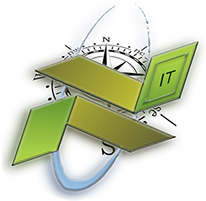

1-780-849-0667
All materials and media contained in this site is expressly owned by 1962676 Alberta Ltd. o/a NorthernIT and/or it's Subsidiaries BroadScope Consulting
All rights reserved and no use of content contained herein is permitted with prior written permission of the owner. Copyright 2017.
To Reach Our Helpdesk Please Call 1-780-849-0667
If you are experiencing a systems down emergency, you can also access immediate help by sending an email to:
h e l p @ n o r t h e r n i t . b i z


What is IT?
Information Technologist
Information technologists can be employed by any business or organization that uses computers on a wide scale basis. Some even work for independent companies, being hired by smaller companies to come in and assist with computer problems. Information technologists can work by themselves or in groups, but generally they report to a senior project manager. The senior project manager regularly assigns specific duties to an information technologist. These duties are divided between normal daily routines and specific long-term projects.
Technical issues that are less complex typically fall to the information technologist to take care of. This can include updating security policies and procedures, maintaining information databases, and creating reports on them for the senior project manager. Information technologists also handle addressing everyday concerns by co-workers or answering their computer related questions when they arise.
Information technology
The field of engineering involving computer-based hardware and software systems, and communication systems, to enable the acquisition, representation, storage, transmission, and use of information. Successful implementation of information technology (IT) is dependent upon being able to cope with the overall architecture of systems, their interfaces with humans and organizations, and their relationships with external environments. It is also critically dependent on the ability to successfully convert information into knowledge.
Information technology is concerned with improvements in a variety of human and organizational problem-solving endeavors through the design, development, and use of technologically based systems and processes that enhance the efficiency and effectiveness of information in a variety of strategic, tactical, and operational situations. Ideally, this is accomplished through critical attention to the information needs of humans in problem-solving tasks and in the provision of technological aids, including electronic communication and computer-based systems of hardware and software and associated processes. Information technology complements and enhances traditional engineering through emphasis on the information basis for engineering.
The knowledge and skills required in information technology come from the applied engineering sciences, especially information, computer, and systems engineering sciences, and from professional practice. Professional activities in information technology and in the acquisition of information technology systems range from requirements definition or specification, to conceptual and functional design and development of communication and computer-based systems for information support. They are concerned with such topics as architectural definition and evaluation. These activities include integration of new systems into functionally operational existing systems and maintenance of the result as user needs change over time. This human interaction with systems and processes, and the associated information processing activities, may take several diverse forms, i.e., "Re-engineering", "Systems architecture", or "Systems engineering".
The hardware and software of computing and communications form the basic tools for information technology. These are implemented as information technology systems through use of systems engineering processes. While information technology and information systems engineering does indeed enable better designs of systems and existing organizations, it also enables the design of fundamentally new organizations and systems such as virtual corporations. Thus, efforts in this area include not only interactivity in working with clients to satisfy present needs but also awareness of future technological, organizational, and human concerns so as to support transition over time to new information technology-based services.
Citing from: McGraw-Hill Concise Encyclopedia of Engineering. © 2002 by The McGraw-Hill Companies, Inc.
